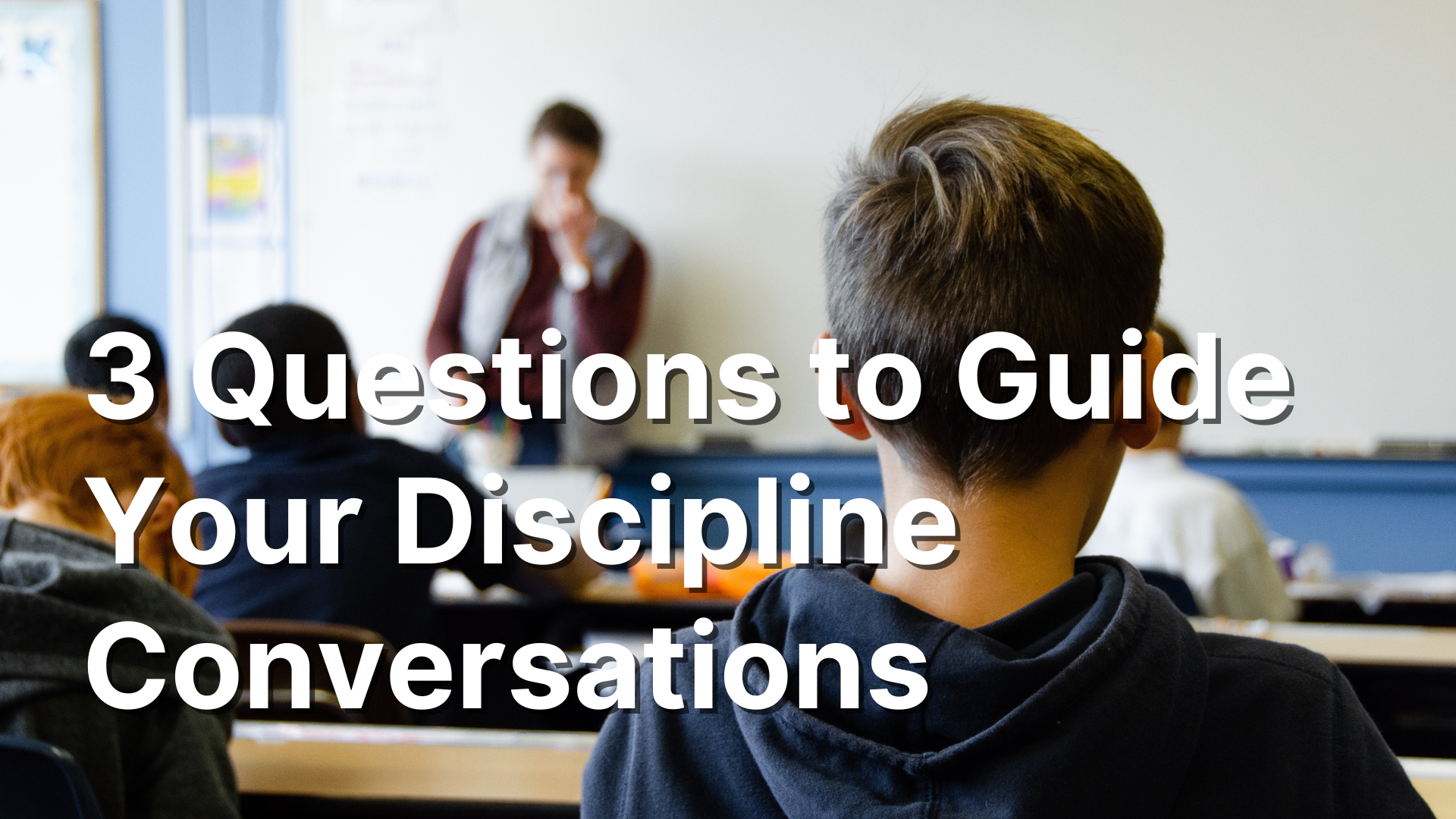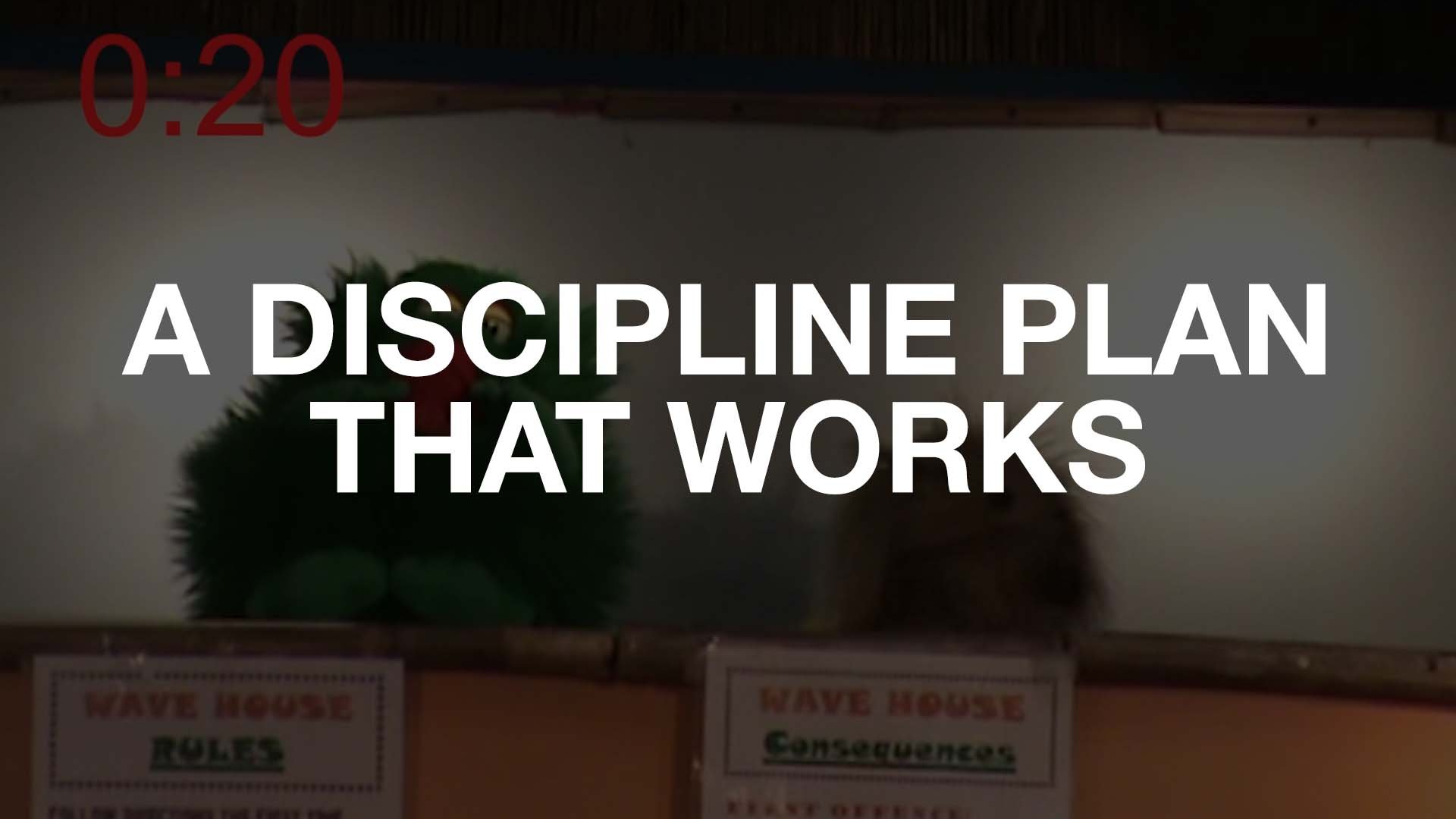3 Questions to Guide Your Discipline Conversations
Photo by Taylor Flowe on Unsplash
I was the bad kid in school. Not throughout my whole educational career, just Kindergarten. I knew how to push my teacher’s buttons and did it regularly. Her discipline plan was to write our names on the board and then add up to three checks before sending us to the office. I had a knack for getting two checks every day and then becoming a perfect angel. I never earned that third check.
Teachers talk to each other, so when I started first grade, I was labeled a bad kid. I was regarded with suspicion and missed out on many rewards. Even though my behavior had significantly improved, you couldn’t tell by the way the teacher treated me. It took a parent-teacher conference and the principal to set things right.
As a result, I’ve always had a soft spot for the problem kids. You’ve heard the phrases. Just wait until she comes to kids’ church, you’re going to have a hard time. Or, I always have problems with him he just won’t listen or sit still. I get excited for these kids and maybe give them more grace than I should. However, many of them thrive while they’re with me.
I’ve written about my discipline plan before. And today I want to go further and talk about what happens when the consequences go into effect. Yes, sometimes the “bad” kids are bad. They won’t listen. They won’t sit. They won’t cooperate. But sometimes they’re misunderstood and have good reasons for the things they do.
As pastors, it’s our job to help them through it, to love and care for them as much as the kid who never causes problems.
One of the things I do to care for misbehaving kids is to make sure they know what they did wrong and how they can do better next time. This is not a public conversation or one where I’m standing over them creating fear and shame. Instead, it’s a private conversation away from everyone else where I’m mostly asking questions and looking for feedback.
It’s an art more than a science. I want them to understand without putting words in their mouth. So, I ask three questions that get to the root of the problem and find a way forward.
1. Ask, “Why did you face this consequence?”
One of my consequences is the kid is moved away from their friends and eventually away from everyone. Many times, the kids are upset and have reasons for their misbehavior. Sometimes they have no idea why they’re being moved. After they’ve been moved during a transition, I find a quiet place to speak with them privately, where no one else can overhear.
My first question is, “why did I move you?” I’m looking for the specific action they took that broke the rules. Things like, they were talking to their friend after I asked them to stop. Or they moved around after they were asked to stay in their seat.
It’s not unusual for kids to say they don’t know or blame someone else. When this happens, it’s important to redirect the conversation back to them and what they did. I describe the situation up to the point where they misbehaved and ask them to tell me what they did.
Sometimes in this conversation, I’ll find that I missed other kids misbehaving. I’ll acknowledge what the other kids did and, if warranted, apologize for missing it. Then I tell them that I’ll talk to the others later.
Ultimately, I want them to tell me in their own words what they did wrong. This shows they understand that the choices they made led to the consequences. Not because I’m picking on them, don’t like them, or being unfair.
2. Ask, “What can you differently in the future?”
Now that they understand what they did wrong, we can work together to find a different solution. Many times, kids, especially older elementary and middle school, can get so wrapped up in their emotions they can’t think straight. They’re acting on instinct, responding in fight or flight. Having them talk through what happened will help them calm down and rationally think through the situation.
It’s important that you stay calm throughout this conversation. If you’re angry or frustrated, take the time you need to put those feelings aside. If you go in hot and let your emotions take over, this will not go well.
As they talk through what they can do differently, point out what’s good and bad about their plan. Telling their friend to shut up isn’t a good solution, but asking to move somewhere else is. The key here is you want their plan to reflect what you want to be seen in your environment. Don’t let them come up with something that breaks even more rules.
Sometimes a kid will say they don’t know what they could have done. At this point it’s ok to offer some solutions, even silly and ridiculous ones. A little laughter will break the tension and help both of you relax. Let them pick what they think is the best solution and say it back to you. Again, we want them to understand what they did wrong and how to respond correctly in the future.
3. Ask, “Can I count on you to do [solution] in the future?”
At this point you’ve built rapport and trust. They should have calmed down and understood that you’re on their side helping them navigate through a difficult situation. Most kids want to please the leader in the room, so by asking “can I count on you?”, you’re giving them an easy way to win favor.
This way, you have a new phrase when they begin to misbehave again. You can say “[kid’s name], we talked about this, and you said I can count on you. Is that still true?” The question usually stops them in their tracks and redirects their behavior.
If they say no, there may be some more underlying trust issues with you or the kids around them. Ask more questions to find out what it may be and address them appropriately. At this point, I may even involve the parents and look for their support.
However, in all my years in kidmin, I can’t think of a single time a kid told me no. They usually really want to be counted on or are just saying what they need to get out of the conversation. It’s a win with the former and an invitation for more conversations with the latter, possibly with their parent.
Either way, once the kid agrees, I allow them to join the rest of the kids and participate in the activities as before. You don’t want church to be a place filled with shame, hurt, and embarrassment. Now that they know what they’ve done, planned for the future, and committed to following it, there’s little reason for further punishment.
If I still need to enforce a consequence, like talking to their parent, I’ll make that clear before I release them, so they don’t think they’re off the hook or surprised when they’re punished further.
Using these questions take patience and skill. I attended a 3-day workshop for my teaching degree to learn them. However, I can tell you that even my worst behaving kids loved coming to kids’ church. I still had discipline problems, but the kids knew what they did wrong and how to respond in the future.
We are shaping kids’ impression of our loving Father. He loves us and forgives us. However, we still have to face the consequences. There is no shame or condemnation in the Kingdom, it’s our responsibility to have the same in our environments. Using these three questions helps you do that.
If you’d like to see my discipline plan I’ve used for years, read my post here.





Planning VBS can be overwhelming. Make it easy with my VBS To-Do List! It's the tool I use to plan my own VBS every year, and it will give you everything you need, no matter what curriculum you choose. Get yours today and simplify your VBS planning!